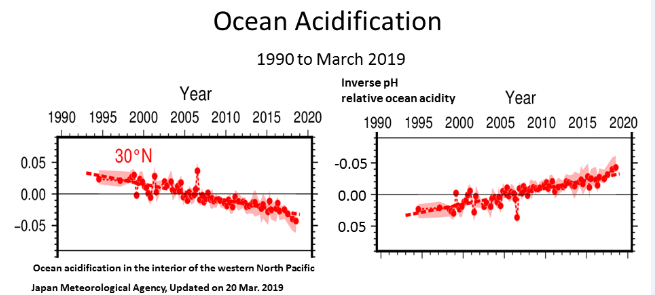Alaskan Fisheries and Communities at Risk from Ocean Acidification
Expert Assessment: Ocean Acidification May Increase 170 Percent this Century
CO2-Hungry Microbes Might Short-circuit the Marine Foodweb
Unprecedented Rate & Scale of Ocean Acidification Found in Arctic
Tiny Plankton Could Have Big Impact on Climate
Study finds coral reefs under even greater threat,
Future reef decalcification under a business-as-usual CO2 emission scenario, PNAS
Ocean Acidification Amplifies Global Warming
Scientists Analyze the Effect of Ocean Acidification on Marine Life
Futuristic View of Acidic Oceans Looks Bleak
Atmospheric Carbon Dioxide is Altering Marine Food-chain
Atmospheric Carbon Dioxide Levels Surpass 400 Parts per Million
Expert Assessment: Ocean Acidification May Increase 170 Percent this Century
CO2-Hungry Microbes Might Short-circuit the Marine Foodweb
Unprecedented Rate & Scale of Ocean Acidification Found in Arctic
Tiny Plankton Could Have Big Impact on Climate
Study finds coral reefs under even greater threat,
Future reef decalcification under a business-as-usual CO2 emission scenario, PNAS
Ocean Acidification Amplifies Global Warming
Scientists Analyze the Effect of Ocean Acidification on Marine Life
Futuristic View of Acidic Oceans Looks Bleak
Atmospheric Carbon Dioxide is Altering Marine Food-chain
Atmospheric Carbon Dioxide Levels Surpass 400 Parts per Million
Sea Change: Ocean acidification, the lesser-known twin of climate change, threatens to scramble marine life on a scale almost too big to fathom - an excellent interactive multi-media primer on ocean acidification by The Seattle Times
Ocean Acidification
Arctic Ocean Acidification: pelagic ecosystem and biogeochemical responses during a mesocosm study.
Special issue of Biogeosciences, 2013
Special issue of Biogeosciences, 2013

2009 Monaco Declaration by scientists on ocean acidification
Research
Research Links
by date
23 July 2018 Fish lose sense of smell and ability to find food as climate change turns oceans to acid
14 March 2018 Phytoplankton Coral reef experiment shows: Acidification from carbon dioxide slows growth
14 March 2018 Key biological mechanism is disrupted by ocean acidification. Inability of phytoplankton to acquire iron imperils marine ecosystems
July 2016 Nat Geo Acidification more damaging to coral (on top of ocean warming bleaching damage - death)
23 March 2016 Reviews and Syntheses: Ocean acidification - synergistic damaging effects.
4 Feb 2016 Article The Atlantic Ocean Is Acidifying At A Rapid (increasing) Rate.
Paper abstract
16 June 2015 Ocean acidification corrode marine animals shells by 2030
Nov 2014 Basin-scale estimates of pelagic and coral reef calcification in the Red Sea and Western Indian Ocean. PNAS vol. 111 no. 46, 16303–16308, doi: 10.1073/pnas.1414323111
Nov 2014 Climate change puts coastal crabs in survival mode. Temperature and acidification variability reduce physiological performance in the intertidal zone porcelain crab Petrolisthes cinctipes. Journal of Experimental Biology, 2014; 217 (22): 3974 DOI: 10.1242/jeb.109801
Nov 2014 Effects of ocean acidification on the biogenic composition of the sea-surface microlayer: Results from a mesocosm study. Journal of Geophysical Research: Oceans, 2014; DOI: 10.1002/2014JC010188
Sept 2014 Ocean acidification could lead to collapse of coral reefs: Over 33 years, a 40 percent reduction in calcium carbonate deposits in Australia's Great Barrier Reef. Community calcification in Lizard Island, Great Barrier Reef: A 33 year perspective. Geochimica et Cosmochimica Acta, 2014; DOI: 10.1016/j.gca.2014.09.011
June 2014 Modern ocean acidification is outpacing ancient upheaval, study suggests - rate may be 10 times faster, according to new data [Paleoceanography, 2014; DOI: 10.1002/2014PA002621]
May 2014 Video report Pteropods 'Vital part of
food web dissolving'.
April 2014 California coast pteropd die-off from acidification
April 2013
Fatal behaviour change
in small fish and fish cannot adapt to rising
acidification
2010 Paleo-perspectives on ocean acidification
Highest in millions of years
14 March 2018 Phytoplankton Coral reef experiment shows: Acidification from carbon dioxide slows growth
14 March 2018 Key biological mechanism is disrupted by ocean acidification. Inability of phytoplankton to acquire iron imperils marine ecosystems
July 2016 Nat Geo Acidification more damaging to coral (on top of ocean warming bleaching damage - death)
23 March 2016 Reviews and Syntheses: Ocean acidification - synergistic damaging effects.
4 Feb 2016 Article The Atlantic Ocean Is Acidifying At A Rapid (increasing) Rate.
Paper abstract
16 June 2015 Ocean acidification corrode marine animals shells by 2030
Nov 2014 Basin-scale estimates of pelagic and coral reef calcification in the Red Sea and Western Indian Ocean. PNAS vol. 111 no. 46, 16303–16308, doi: 10.1073/pnas.1414323111
Nov 2014 Climate change puts coastal crabs in survival mode. Temperature and acidification variability reduce physiological performance in the intertidal zone porcelain crab Petrolisthes cinctipes. Journal of Experimental Biology, 2014; 217 (22): 3974 DOI: 10.1242/jeb.109801
Nov 2014 Effects of ocean acidification on the biogenic composition of the sea-surface microlayer: Results from a mesocosm study. Journal of Geophysical Research: Oceans, 2014; DOI: 10.1002/2014JC010188
Sept 2014 Ocean acidification could lead to collapse of coral reefs: Over 33 years, a 40 percent reduction in calcium carbonate deposits in Australia's Great Barrier Reef. Community calcification in Lizard Island, Great Barrier Reef: A 33 year perspective. Geochimica et Cosmochimica Acta, 2014; DOI: 10.1016/j.gca.2014.09.011
June 2014 Modern ocean acidification is outpacing ancient upheaval, study suggests - rate may be 10 times faster, according to new data [Paleoceanography, 2014; DOI: 10.1002/2014PA002621]
May 2014 Video report Pteropods 'Vital part of
food web dissolving'.
April 2014 California coast pteropd die-off from acidification
April 2013
Fatal behaviour change
in small fish and fish cannot adapt to rising
acidification
2010 Paleo-perspectives on ocean acidification
Highest in millions of years
2011 IPCC Workshop on Impacts of Ocean Acidification on Marine Biology & Ecosystems
January 2011 Okinawa, Japan
January 2011 Okinawa, Japan


Nov 2015 VIDEO Rapidly acidifying southern ocean waters (good explanation of ocean acidification)
3 Nov 2015 Abrupt changes in food
chains predicted as Southern Ocean
acidifies fast: study
chains predicted as Southern Ocean
acidifies fast: study
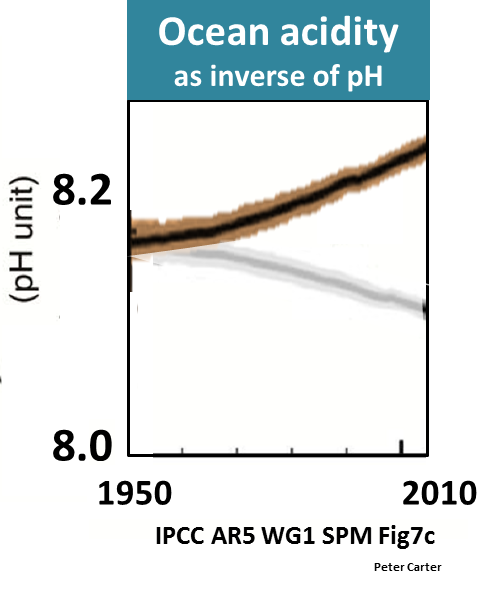
2010 Paleo-perspectives on ocean acidification Carles Pelejero
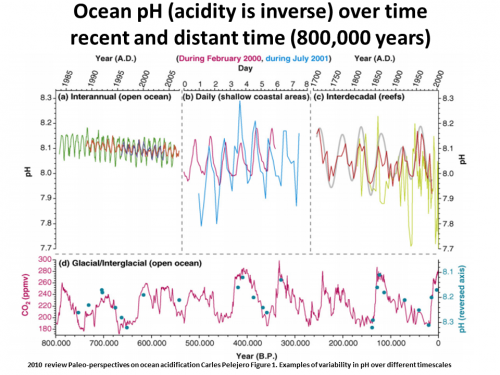
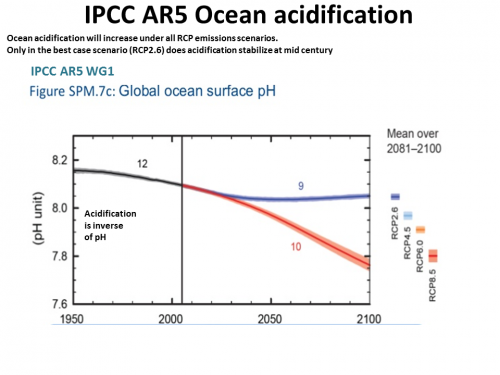
Each unit on the pH scale represents a tenfold
inverse
change in acidity.
inverse
change in acidity.
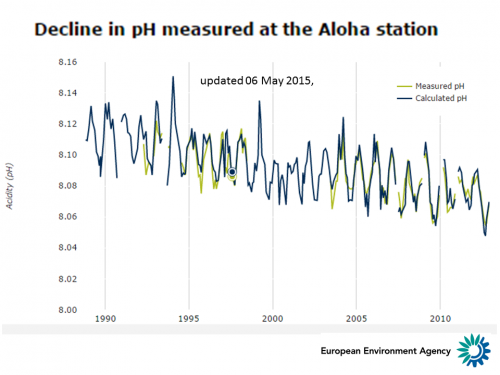
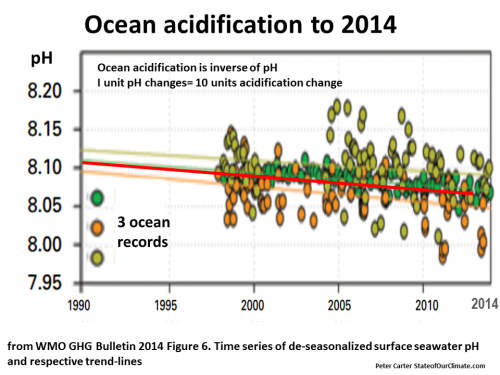
Feb 2016 Sea Change: the Pacific's perilous turn
Prior to industrialization, the concentration of carbon dioxide in the atmosphere was 280 parts per million (ppm). With increased use of fossil fuels, that number is now over 400 ppm and the growth rate is accelerating. Scientists calculate that the ocean is currently absorbing about one quarter of the CO2 that humans are emitting. When CO2 combines with seawater, chemical reactions occur that reduce the seawater pH. pH is the measure of relative alkalinity and acidity.
Seawater has a pH of 8.2 on average because it contains naturally occurring alkaline ions that come primarily from weathering of continental rocks. When seawater absorbs carbon dioxide from the atmosphere, carbonic acid is produced surface ocean pH has decreasedThe average pH of ocean surface waters has fallen by about 0.1 units, from 8.2 to 8.1, since the beginning of the industrial revolution. This corresponds to a 26% increase in acidity. This makes ocean acidification today the highest in over 20 million years.
Because the pH scale is logarithmic (a change of 1 pH unit represents a tenfold change in acidity), this change represents a 26 percent increase in acidity over roughly 250 years, a rate that is 100 times faster than anything the ocean and its inhabitants have experienced in tens of millions of years and soon the fastest in 300 million years.
Seawater has a pH of 8.2 on average because it contains naturally occurring alkaline ions that come primarily from weathering of continental rocks. When seawater absorbs carbon dioxide from the atmosphere, carbonic acid is produced surface ocean pH has decreasedThe average pH of ocean surface waters has fallen by about 0.1 units, from 8.2 to 8.1, since the beginning of the industrial revolution. This corresponds to a 26% increase in acidity. This makes ocean acidification today the highest in over 20 million years.
Because the pH scale is logarithmic (a change of 1 pH unit represents a tenfold change in acidity), this change represents a 26 percent increase in acidity over roughly 250 years, a rate that is 100 times faster than anything the ocean and its inhabitants have experienced in tens of millions of years and soon the fastest in 300 million years.
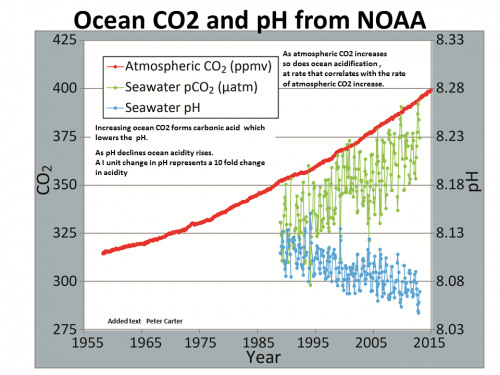
2017 BIOACID Largest study ever show ocean acidification along with other ocean effects of atmospheric CO2 pollution puts practically all marine life at risk.
Nov 2017 IUCN Ocean acidification brief (10X faster than past 300 million years)
Nov 2017 IUCN Ocean acidification brief (10X faster than past 300 million years)
Japan Met best data site Ocean acidification in the western North Pacific
